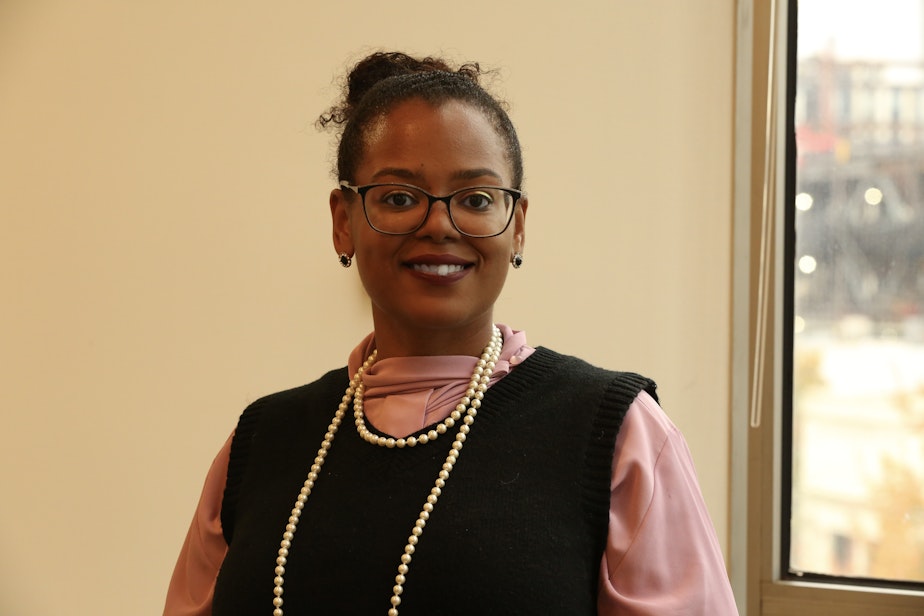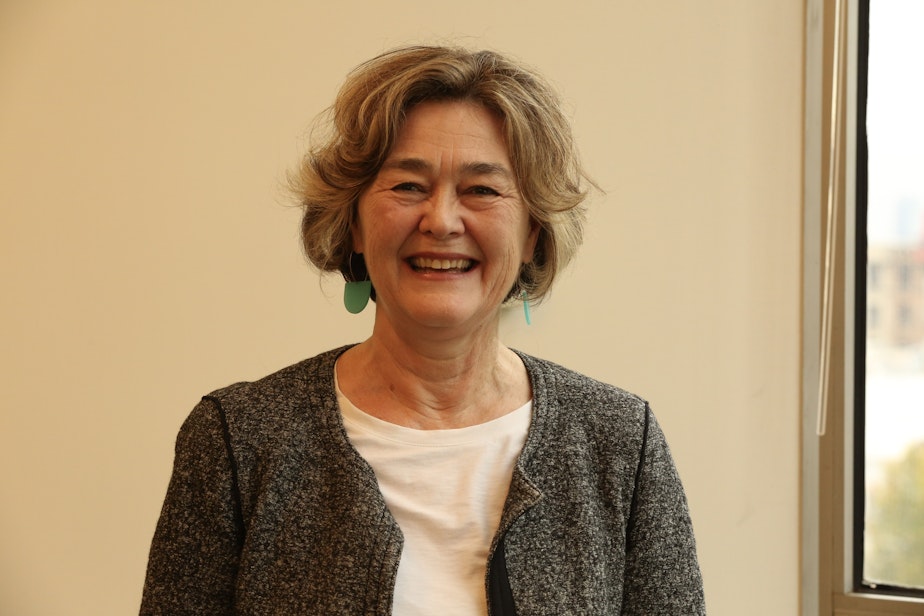North Seattle Council candidates are miles apart on police funding, drug law

In a series of polite but pointed exchanges on key issues facing Seattle, social equity consultant ChrisTiana ObeySumner and retired Judge Cathy Moore staked out strikingly different positions in a high-speed candidate event this week at KUOW.
The two are running for an open seat in North Seattle’s City Council District 5, which includes the Lake City, Northgate, and Greenwood neighborhoods. Incumbent Debora Juarez is one of several councilmembers not seeking reelection this year, following a tumultuous period marked by deep divisions and acrimony in Seattle politics.
Against that backdrop, Moore and ObeySumner squared off on police funding and staffing, the city’s controversial new drug possession ordinance, and the need for more affordable housing.
While Moore told KUOW the city’s current spending on the Seattle Police Department is about right, for example, ObeySumner said they’d back “significantly less” funding for SPD in future budgets.

But ObeySumner said their goal is not to “hack slash” the police budget, but to fund alternatives that could also improve public safety, such as mental health crisis response teams.
Sponsored
“I'm really worried about the fact that we put so much reliance on our police department," ObeySumner said. "We have a lot of amazing nonprofits and organizations that can help to share that load.”
ObeySumner also said moving jobs out of the police department could help with police “burnout,” and, in turn, with retention and sluggish recruitment that have dramatically reduced the size of the department over the last few years.
Disagreeing, Moore said she supports Mayor Bruce Harrell’s goal of hiring an additional 300 to 400 officers, which is what police “tell us they need to do the job of responding to priority one violence calls.”
“I don't think we can reduce 911 response times without additional police,” she said. “I don't think we need to over-inflate the budget, but we definitely need to have the budget that's necessary.”
Moore also supports the city’s new ordinance that makes drug use and possession prosecutable under Seattle city law. The measure also emphasizes getting people into treatment as opposed to making arrests.
Sponsored
Moore said she supports the law, even though it allocates no new funding for drug treatment. Moore blamed the City Council for this dearth of treatment money.
“The City Council had two years, if not more, to get the funding to create a treatment infrastructure. And they woefully underperformed,” Moore said, adding that money for treatment is something she’d support, if elected.

In contrast, ObeySumner said they’re opposed to the new drug ordinance, citing research that shows jailing drug users doesn’t necessarily solve addiction issues. ObeySumner, who has worked in social services and has direct experience with people in the throes of addiction, also said prosecuting low-level drug dealers, who are themselves struggling with addiction, is not helpful.
“I have had clients die in my arms,” she said. “What we really need is an investment to scale in social service programs to give opportunities for those lower-level dealers to be able to have access to other vocations.”
Sponsored
ObeySumner’s prior experience includes work at Harborview Medical Center and Seattle’s Downtown Emergency Service Center, a nonprofit that helps people with homelessness, substance use disorders, and mental illness.
On housing, ObeySumner also said they support government policies that would lead to more housing of all types, all over the city. And they said, with the right approach, Seattle voters who are currently opposed to more density can be persuaded to embrace change.
“Wouldn’t it be great to have more neighbors, more kids trick-or-treating at Halloween, more dogs to play with at the park, more opportunities to build a community?" they asked.
Moore said more housing is needed, including public housing as well as more affordable housing for city workers.
“We need to be looking at how we mandate a certain amount of onsite affordable housing. When you look at the statistics, that’s where the greatest need is," she said. "For our nurses, our police, day care workers, all those people we want to remain in the city.”






